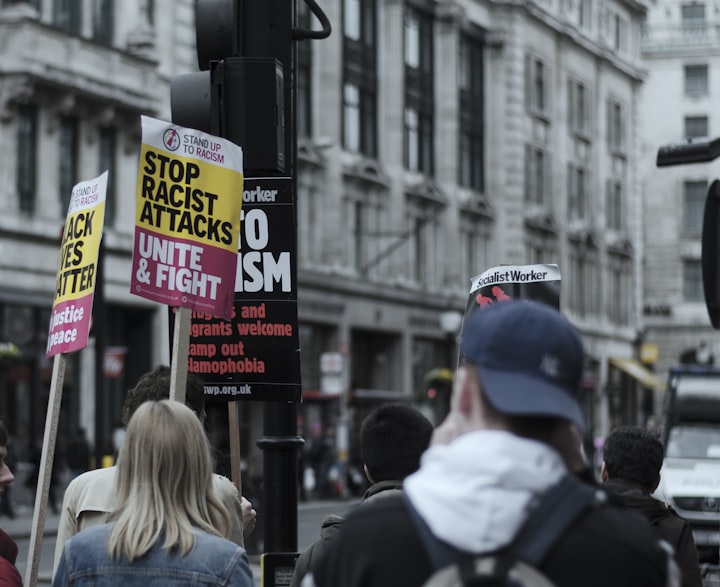It has always been apparent that my parents grew up in a different world to me. They both came from Hong Kong and emigrated to Australia over forty years ago: a whole different culture and time than the world in which I grew up. We don't often agree a lot on politics, particularly on social issues. My mum just can't wrap her head around homosexuality; she let out a small scream when she first saw a gay kiss on Glee that was playing on the TV. She often says things about other ethnic groups I have to call her out on as insensitive or not constructive.
So when the events over the past week began to unfold after George Floyd's death unravelled, I was a little worried. Not only was I myself coming to terms with the horrific act and the anger that was spilling onto the streets in protest, I was also worried about the conversations I might have to have with my parents.
This is a moment in time when we've all been called to reflect on our own systemic biases and actively be anti-racist. Never before have we seen such a powerful and universal call to fight the institutions that have allowed this to happen time and time again. It is confronting and it is hard but it is the responsibility of us all.
As someone of Asian descent, we are not exempt just because we too are people of colour. The civil rights movement paved the way for many of us to obtain the same rights in countries like the US and Australia. And the #BlackLivesMatter movement calls for a dismantling of white supremacy that would also remove the barriers that Asian Americans face too.
And in the plethora of valuable resources that came out on allyship - and in particular allyship for the Asian community - there was this call to talk to our parents and elders. Yes, they did come from a different time but now was also the time to have that difficult conversation.
The thing is: I didn't have to.
My parents were just as outraged, upset and fired up by what they were seeing. The things is injustice isn't a generational idea. This is a moment where we can all see the pain behind the protests - my parents aren't exempt from that. As humans, we can see these scenes and all empathise and try and understand why this has happened. Or at the very least, we can all be united in condemning the actions and rhetoric of the president at this time.
We should also not discredit our older generations for what they may believe or how they see it too.
Firstly, it is in our parent's generations that many of the civil rights movement were occurring. They've lived through this. Racial narratives and a fight for injustice weren't invented with the internet or the generation that were born with it. It may look different now, the revolution may now be tweeted and not just televised. But it is not new.
Secondly - and forgive me if this turns out a little reductionist - a fight against racism is one we Asians have been a part of too. Yes, we have never had to fear for our lives, nor fear the institutions for being the ones that take it from us. But the deep-rooted systemic problems manifest every day for us in different ways as well.
We understand how the way you look can change the behaviour of the people around you. We had a taste of what it was to fear violence as people began to attack Asians on the street during the pandemic. We may not fully understand the full experience many African Americans have but it's not completely foreign either.
But the protests also feel like they hit close to home, particularly as we come up to the year anniversary of protest in Hong Kong. And much of the rhetoric and things that we are seeing seem too familiar. The theories that police have been doing the looting, leaving bricks out so they can blame it on the protestors - we've heard them in HK. The huge escalations of peaceful protests by riot police - I was there for that in November last year and saw it first hand. We stood near the bars of Lan Kwai Fong on Halloween night, merely chanting 'we want beer,' peaceful, even a little jovial. The police in full riot gear started to bang their batons, a tear gas went off in the packed crowd, we were intimidated off the street.
After a year, the Hong Kong protests still persist. On one hand, it's great to see the continued resilience of protesters for their cause, albeit for a very different fight. I hope this movement doesn't end with black squares on Instagram and until the next news cycle comes around. On the other hand, it's also crippled the Hong Kong economy and livelihood. We also fear that for a world still going through a global pandemic.
But, as my mother keeps saying, what brings this altogether in a scary way is seeing the Hong Kong protesters clinging onto an American flag as though their government might be able to save them in this predicament. The failure of the US president to be an ally for his own people is disappointing to say the least; but leaves a sinking feeling in any form of optimism for the future of Hong Kong.
The thing is: no, we may never understand the full African American experience. But it is not enough to say we do not understand and leave the fight up to them. As my friend, Amanda, so eloquently said, "If you cannot understand the pain of another person, it is because you have stripped them of their humanity and see before you an alien, somebody who is not the same as you." We all have frames of reference which we can pull on where we can empathise this idea of frustration, fear, injustice and a call to help things change.
As women, we talk about how we're scared to be alone for fear of being attacked and abused.
As young people, we've riled against governments and institutions that don't help us out enough in a post-GFC economy or cripple us with college debt before we can even find a job.
As people, we are hurt and angry when we see people get murdered.
This is why this fight is so universal. Yes, let us all rally around #BlackLivesMatter because at the bare minimum, they should. But this is something that we all have a stake in if we just try to understand. We can all find it in our hearts to be as frustrated and as motivated as anyone else to demand change. So let's all do the work.
- Donate if you can
- Get educated on the issues
- Follow Black activists and stories at this time
- Support Black-owned businesses and Black artists
- Sign petitions to call for justice
- Join a protest if you are able and feel safe to
- Have the uncomfortable conversations if you need
NB: this is not a conclusive list of ways to help but this is a way to start.
About the Creator
Tiff Ng
Social storyteller, travelling the world with a heart still in Aus.







Comments
There are no comments for this story
Be the first to respond and start the conversation.